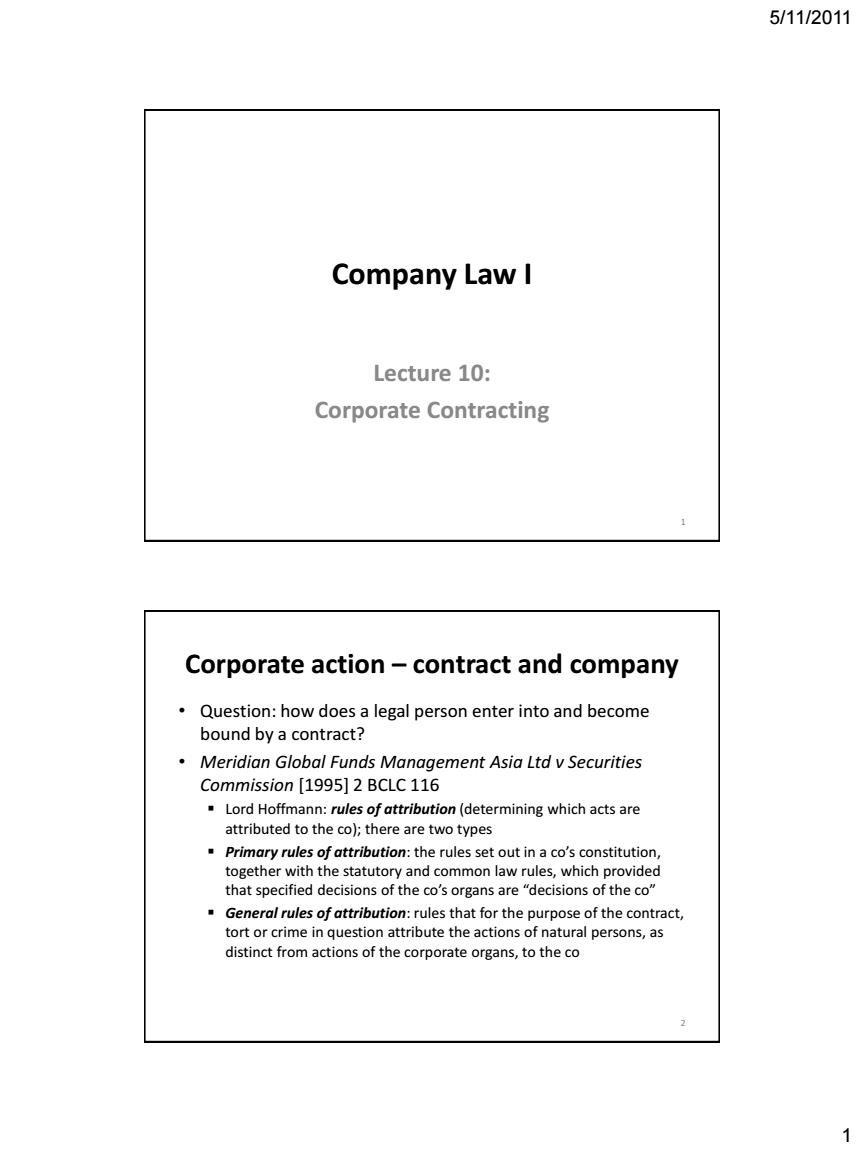
5/11/2011 Company Law I Lecture 10: Corporate Contracting Corporate action-contract and company Question:how does a legal person enter into and become bound by a contract? Meridian Global Funds Management Asia Ltd v Securities Commission [1995]2 BCLC 116 Lord Hoffmann:rules of attribution(determining which acts are attributed to the co);there are two types Primary rules of attribution:the rules set out in a co's constitution, together with the statutory and common law rules,which provided that specified decisions of the co's organs are"decisions of the co" General rules of attribution:rules that for the purpose of the contract, tort or crime in question attribute the actions of natural persons,as distinct from actions of the corporate organs,to the co 1
5/11/2011 1 1 Company Law I Lecture 10: Corporate Contracting 2 Corporate action – contract and company • Question: how does a legal person enter into and become bound by a contract? • Meridian Global Funds Management Asia Ltd v Securities Commission [1995] 2 BCLC 116 Lord Hoffmann: rules of attribution (determining which acts are attributed to the co); there are two types Primary rules of attribution: the rules set out in a co’s constitution, together with the statutory and common law rules, which provided that specified decisions of the co’s organs are “decisions of the co” General rules of attribution: rules that for the purpose of the contract, tort or crime in question attribute the actions of natural persons, as distinct from actions of the corporate organs, to the co
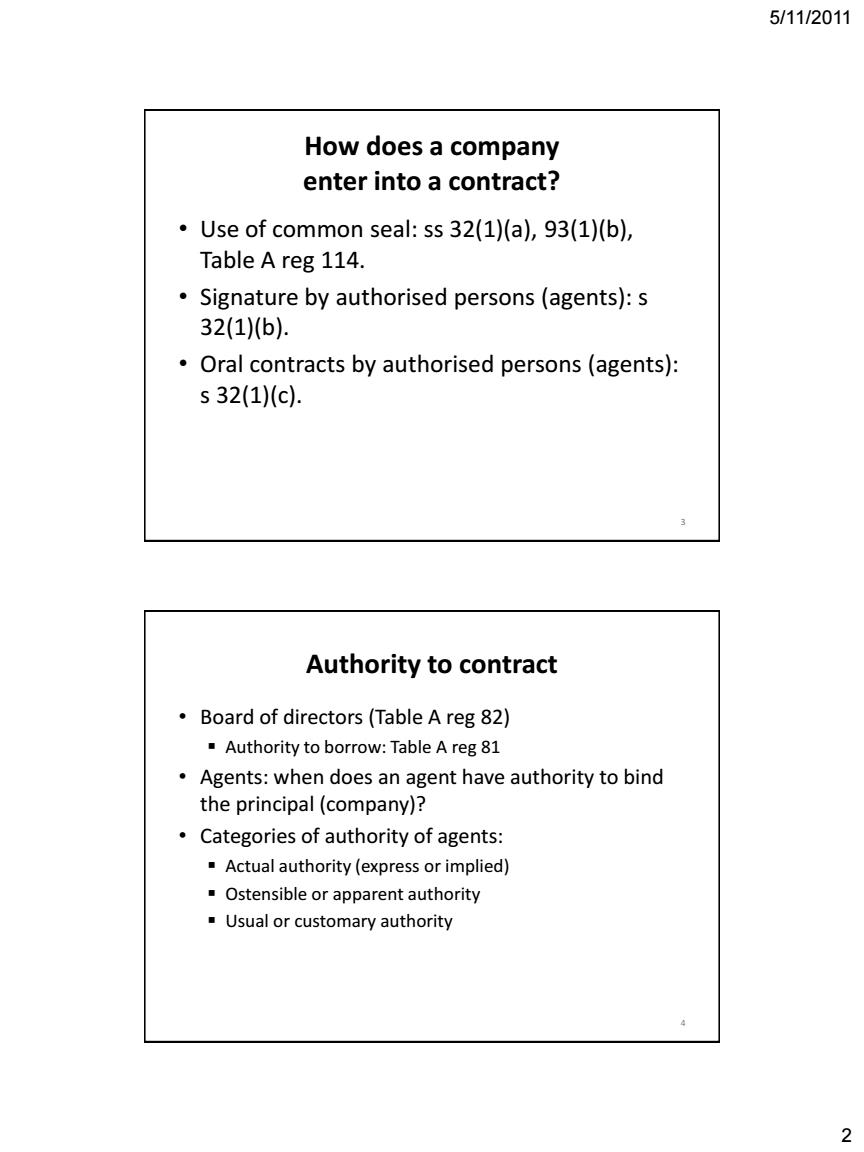
5/11/2011 How does a company enter into a contract? Use of common seal:ss 32(1)(a),93(1)(b), Table A reg 114. Signature by authorised persons (agents):s 32(1)(b). Oral contracts by authorised persons(agents): s32(1)(c. Authority to contract Board of directors(Table A reg 82) Authority to borrow:Table A reg 81 Agents:when does an agent have authority to bind the principal(company)? Categories of authority of agents: Actual authority(express or implied) Ostensible or apparent authority Usual or customary authority 2
5/11/2011 2 3 How does a company enter into a contract? • Use of common seal: ss 32(1)(a), 93(1)(b), Table A reg 114. • Signature by authorised persons (agents): s 32(1)(b). • Oral contracts by authorised persons (agents): s 32(1)(c). 4 Authority to contract • Board of directors (Table A reg 82) Authority to borrow: Table A reg 81 • Agents: when does an agent have authority to bind the principal (company)? • Categories of authority of agents: Actual authority (express or implied) Ostensible or apparent authority Usual or customary authority
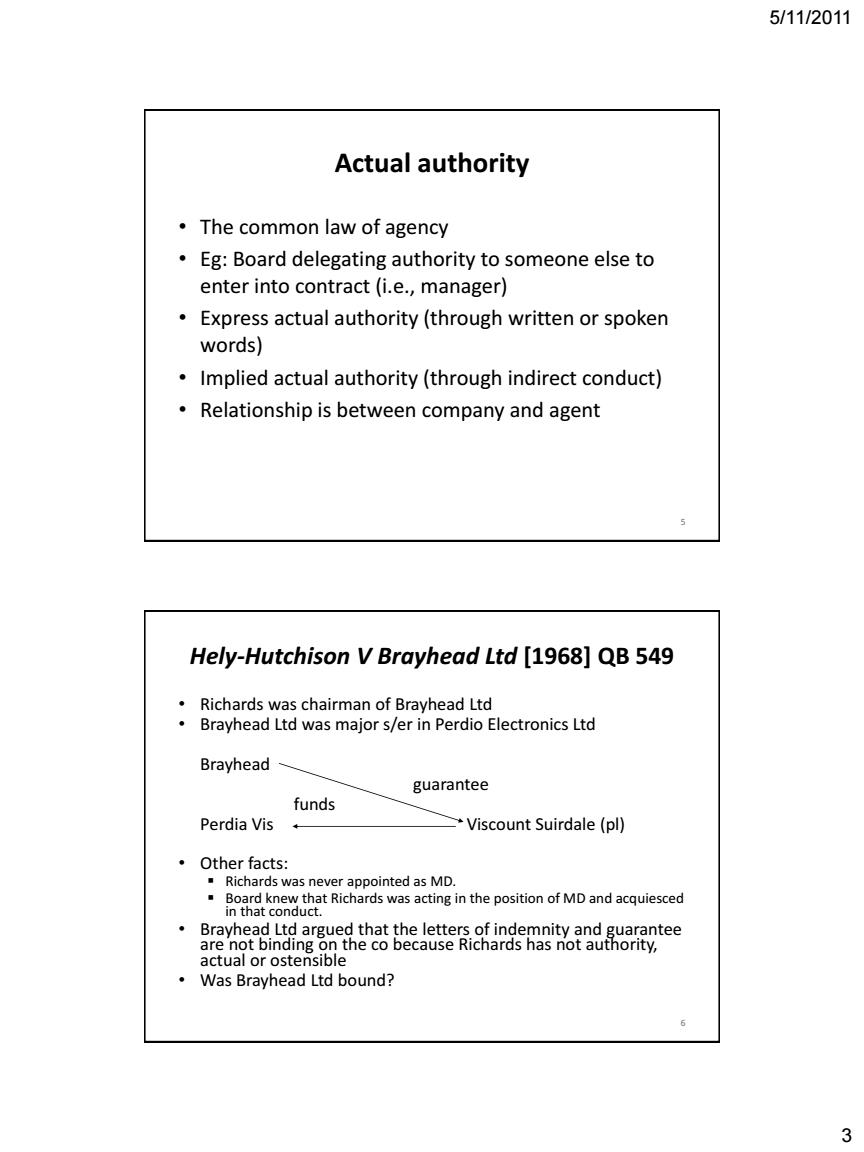
5/11/2011 Actual authority The common law of agency Eg:Board delegating authority to someone else to enter into contract(i.e.,manager) Express actual authority(through written or spoken words) Implied actual authority(through indirect conduct) Relationship is between company and agent Hely-Hutchison V Brayhead Ltd [1968]QB 549 Richards was chairman of Brayhead Ltd Brayhead Ltd was major s/er in Perdio Electronics Ltd Brayhead guarantee funds Perdia Vis -Viscount Suirdale(pl) ·Other facts: Richards was never appointed as MD. Board knew that Richards was acting in the position of MD and acquiesced in that conduct. Brayhead Ltd argued that the letters of indemnity and guarantee are not binding on the co because Richards has not authority, actual or ostensible Was Brayhead Ltd bound? 3
5/11/2011 3 5 Actual authority • The common law of agency • Eg: Board delegating authority to someone else to enter into contract (i.e., manager) • Express actual authority (through written or spoken words) • Implied actual authority (through indirect conduct) • Relationship is between company and agent 6 Hely-Hutchison V Brayhead Ltd [1968] QB 549 • Richards was chairman of Brayhead Ltd • Brayhead Ltd was major s/er in Perdio Electronics Ltd Brayhead guarantee funds Perdia Vis Viscount Suirdale (pl) • Other facts: Richards was never appointed as MD. Board knew that Richards was acting in the position of MD and acquiesced in that conduct. • Brayhead Ltd argued that the letters of indemnity and guarantee are not binding on the co because Richards has not authority, actual or ostensible • Was Brayhead Ltd bound?
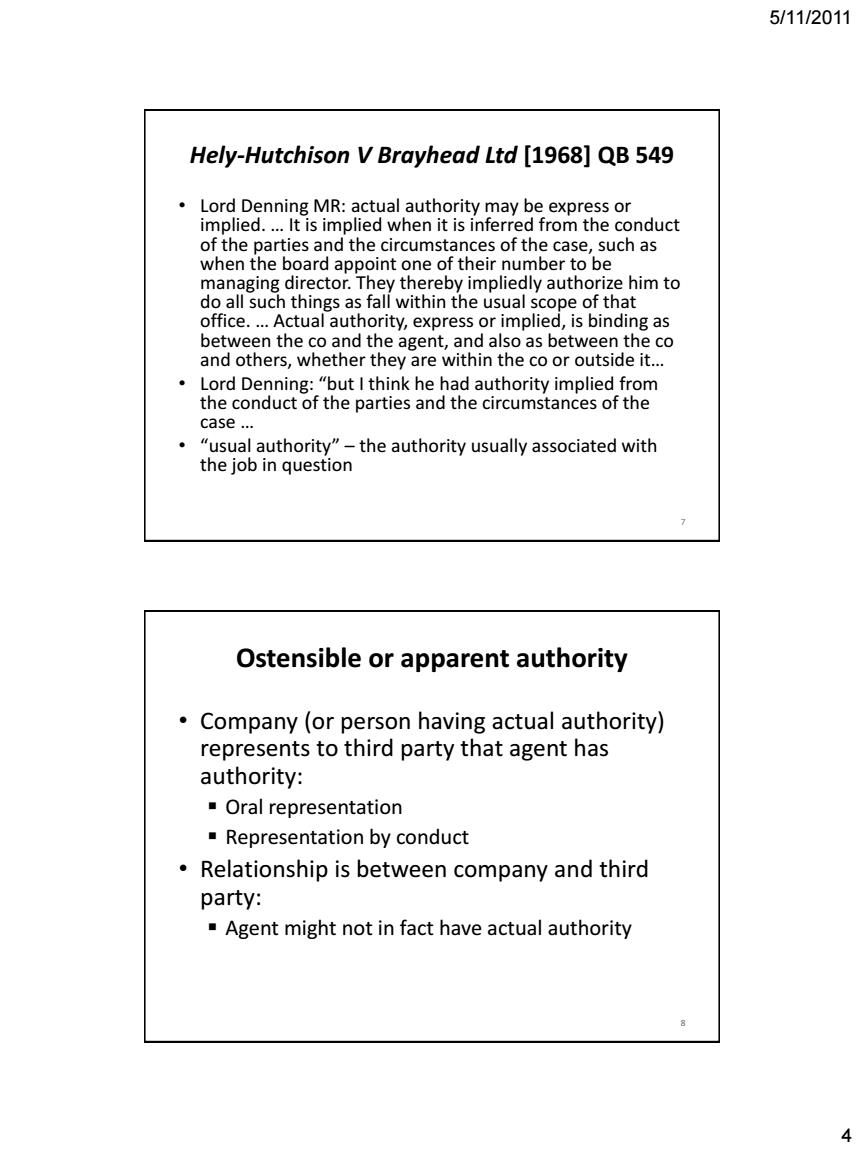
5/11/2011 Hely-Hutchison V Brayhead Ltd [1968]QB 549 Lord Denning MR:actual authority may be express or implied...It is implied when it is inferred from the conduct of the parties and the circumstances of the case,such as when the board appoint one of their number to be managing director.They thereby impliedly authorize him to do all such things as fall within the usual scope of that office....Actual authority,express or implied,is binding as between the co and the agent,and also as between the co and others,whether they are within the co or outside it... Lord Denning:"but I think he had authority implied from the conduct of the parties and the circumstances of the case... ·“usual authority”-the authority usually associated with the job in question Ostensible or apparent authority Company(or person having actual authority) represents to third party that agent has authority: Oral representation Representation by conduct Relationship is between company and third party: "Agent might not in fact have actual authority 4
5/11/2011 4 7 Hely-Hutchison V Brayhead Ltd [1968] QB 549 • Lord Denning MR: actual authority may be express or implied. … It is implied when it is inferred from the conduct of the parties and the circumstances of the case, such as when the board appoint one of their number to be managing director. They thereby impliedly authorize him to do all such things as fall within the usual scope of that office. … Actual authority, express or implied, is binding as between the co and the agent, and also as between the co and others, whether they are within the co or outside it… • Lord Denning: “but I think he had authority implied from the conduct of the parties and the circumstances of the case … • “usual authority” – the authority usually associated with the job in question 8 Ostensible or apparent authority • Company (or person having actual authority) represents to third party that agent has authority: Oral representation Representation by conduct • Relationship is between company and third party: Agent might not in fact have actual authority
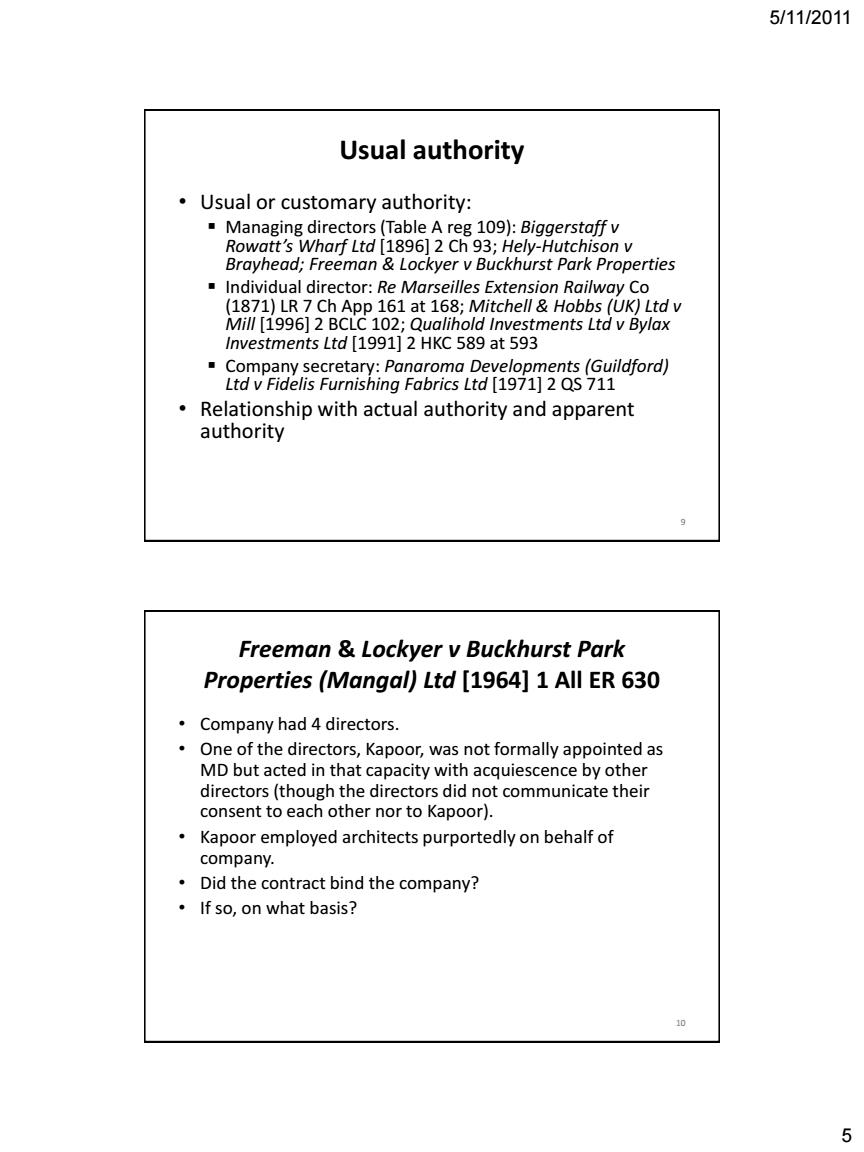
5/11/2011 Usual authority Usual or customary authority: Managing directors(Table A reg 109):Biggerstaffv Rowatt's Wharf Ltd [1896]2 Ch 93;Hely-Hutchison v Brayhead;Freeman Lockyer v Buckhurst Park Properties Individual director:Re Marseilles Extension Railway Co (1871)LR 7 Ch App 161 at 168;Mitchell Hobbs (UK)Ltd v Mill [1996]2 BCLC 102;Qualihold Investments Ltd v Bylax Investments Ltd [1991]2 HKC 589 at 593 Company secretary:Panaroma Developments(Guildford) Ltd v Fidelis Furnishing Fabrics Ltd [1971]2 QS 711 Relationship with actual authority and apparent authority Freeman Lockyer v Buckhurst Park Properties (Mangal)Ltd [1964]1 All ER 630 Company had 4 directors. One of the directors,Kapoor,was not formally appointed as MD but acted in that capacity with acquiescence by other directors(though the directors did not communicate their consent to each other nor to Kapoor). Kapoor employed architects purportedly on behalf of company. Did the contract bind the company? ·lfso,on what basis? 6
5/11/2011 5 9 Usual authority • Usual or customary authority: Managing directors (Table A reg 109): Biggerstaff v Rowatt’s Wharf Ltd [1896] 2 Ch 93; Hely-Hutchison v Brayhead; Freeman & Lockyer v Buckhurst Park Properties Individual director: Re Marseilles Extension Railway Co (1871) LR 7 Ch App 161 at 168; Mitchell & Hobbs (UK) Ltd v Mill [1996] 2 BCLC 102; Qualihold Investments Ltd v Bylax Investments Ltd [1991] 2 HKC 589 at 593 Company secretary: Panaroma Developments (Guildford) Ltd v Fidelis Furnishing Fabrics Ltd [1971] 2 QS 711 • Relationship with actual authority and apparent authority 10 Freeman & Lockyer v Buckhurst Park Properties (Mangal) Ltd [1964] 1 All ER 630 • Company had 4 directors. • One of the directors, Kapoor, was not formally appointed as MD but acted in that capacity with acquiescence by other directors (though the directors did not communicate their consent to each other nor to Kapoor). • Kapoor employed architects purportedly on behalf of company. • Did the contract bind the company? • If so, on what basis?

5/11/2011 Freeman Lockyer v Buckhurst Park Properties (Mangal)Ltd [1964]1 All ER 630 Diplock U:an 'actual'authority is a legal relationship between principal and agent created by a consensual agreement to which they alone are parties.Its scope is to be ascertained by applying ordinary principles of construction of contracts, including any proper implications from the express words used,the usages of the trade,or the course of business between the parties.To this agreement the contractor is a stranger;he may be totally ignorant of the existence of any authority on the part of the agent.Nevertheless,if the agent does enter into a contract pursuant to the 'actual'authority,it does create contractual rights and liabilities between the principal and the contractor... 11 Freeman Lockyer v Buckhurst Park Properties(Mangal)Ltd [1964]1 All ER 630 Diplock U:discussed the relationship between actual and apparent authorities-"they are quite independent of one another.Generally they co-exist and coincide,but either may exist without the other and their respective scopes may be different....It is on the apparent authority of the agent that the contractor normally relies in the ordinary course of business when entering into contracts..." "an 'apparent'authority is a legal relationship between the principal and the contractor created by a representation,made by the principal to the contractor,intended to be and in fact acted on by the contractor,that the agent has authority to enter on behalf of the principal into a contract of a kind within the scope of the 'apparent'authority,so as to render the principal liable to perform any obligations imposed on him by such contract." 12 6
5/11/2011 6 11 Freeman & Lockyer v Buckhurst Park Properties (Mangal) Ltd [1964] 1 All ER 630 • Diplock LJ: an ‘actual’ authority is a legal relationship between principal and agent created by a consensual agreement to which they alone are parties. Its scope is to be ascertained by applying ordinary principles of construction of contracts, including any proper implications from the express words used, the usages of the trade, or the course of business between the parties. To this agreement the contractor is a stranger; he may be totally ignorant of the existence of any authority on the part of the agent. Nevertheless, if the agent does enter into a contract pursuant to the ‘actual’ authority, it does create contractual rights and liabilities between the principal and the contractor … 12 Freeman & Lockyer v Buckhurst Park Properties (Mangal) Ltd [1964] 1 All ER 630 • Diplock LJ: discussed the relationship between actual and apparent authorities – “they are quite independent of one another. Generally they co-exist and coincide, but either may exist without the other and their respective scopes may be different. … It is on the apparent authority of the agent that the contractor normally relies in the ordinary course of business when entering into contracts …” • “an ‘apparent’ authority is a legal relationship between the principal and the contractor created by a representation, made by the principal to the contractor, intended to be and in fact acted on by the contractor, that the agent has authority to enter on behalf of the principal into a contract of a kind within the scope of the ‘apparent’ authority, so as to render the principal liable to perform any obligations imposed on him by such contract

5/11/2011 Freeman Lockyer v Buckhurst Park Properties (Mangal)Ltd [1964]1 All ER 630 Diplock U:4 conditions to be fulfilled to entitle a contractor to enforce against a co a contract entered into on behalf of the co by an agent who had no authority to enter on behalf of do so "apparent authority"operates as an estoppel Difficulty in applying the apparent authority,generally and specifically in this case 13 Panorama Developments(Guildford)Ltd v Fidelis Furnishing Fabrics Ltd [1971]2QB 711(Court of Appeal) Lord Denning:"a company secretary...is an officer with extensive duties and responsibilities....He is no longer a mere clerk.He regularly makes representations on behalf of the co and enters into contracts on its behalf which come within the day-to-day running of the co's business.So much so that he may be regarded as held out as having the authority to do such things on behalf of the co.He is certainly entitled to sign contracts connected with the administrative side of a co's affairs,such as employing staff and ordering cars,and so forth.All such matters now come within the ostensible authority of a co's secretary." 14 7
5/11/2011 7 13 Freeman & Lockyer v Buckhurst Park Properties (Mangal) Ltd [1964] 1 All ER 630 • Diplock LJ: 4 conditions to be fulfilled to entitle a contractor to enforce against a co a contract entered into on behalf of the co by an agent who had no authority to enter on behalf of do so • “apparent authority” operates as an estoppel • Difficulty in applying the apparent authority, generally and specifically in this case 14 Panorama Developments (Guildford) Ltd v Fidelis Furnishing Fabrics Ltd [1971] 2QB 711 (Court of Appeal) • Lord Denning: “a company secretary … is an officer with extensive duties and responsibilities. … He is no longer a mere clerk. He regularly makes representations on behalf of the co and enters into contracts on its behalf which come within the day-to-day running of the co’s business. So much so that he may be regarded as held out as having the authority to do such things on behalf of the co. He is certainly entitled to sign contracts connected with the administrative side of a co’s affairs, such as employing staff and ordering cars, and so forth. All such matters now come within the ostensible authority of a co’s secretary
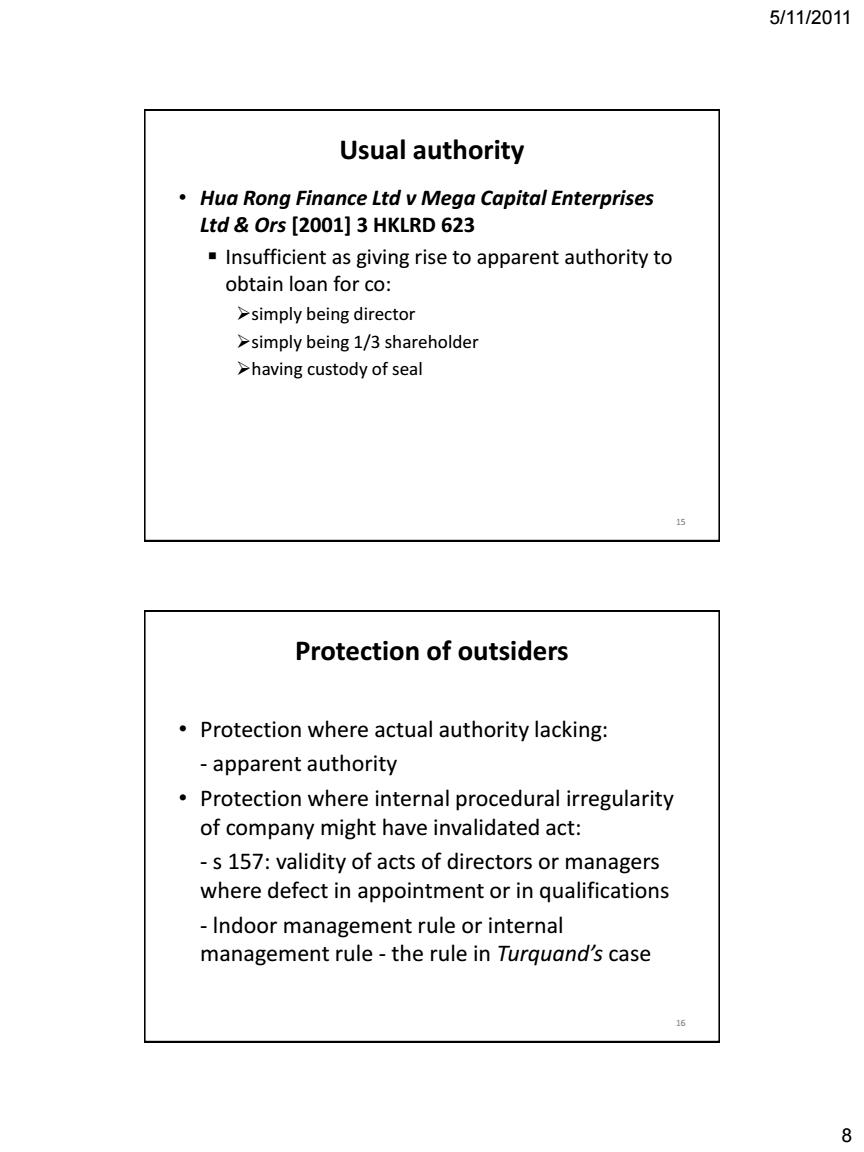
5/11/2011 Usual authority Hua Rong Finance Ltd v Mega Capital Enterprises Ltd Ors [2001]3 HKLRD 623 Insufficient as giving rise to apparent authority to obtain loan for co: >simply being director >simply being 1/3 shareholder >having custody of seal 15 Protection of outsiders Protection where actual authority lacking: apparent authority Protection where internal procedural irregularity of company might have invalidated act: -s 157:validity of acts of directors or managers where defect in appointment or in qualifications Indoor management rule or internal management rule-the rule in Turquand's case 16 8
5/11/2011 8 15 • Hua Rong Finance Ltd v Mega Capital Enterprises Ltd & Ors [2001] 3 HKLRD 623 Insufficient as giving rise to apparent authority to obtain loan for co: simply being director simply being 1/3 shareholder having custody of seal Usual authority 16 Protection of outsiders • Protection where actual authority lacking: - apparent authority • Protection where internal procedural irregularity of company might have invalidated act: - s 157: validity of acts of directors or managers where defect in appointment or in qualifications - lndoor management rule or internal management rule - the rule in Turquand’s case
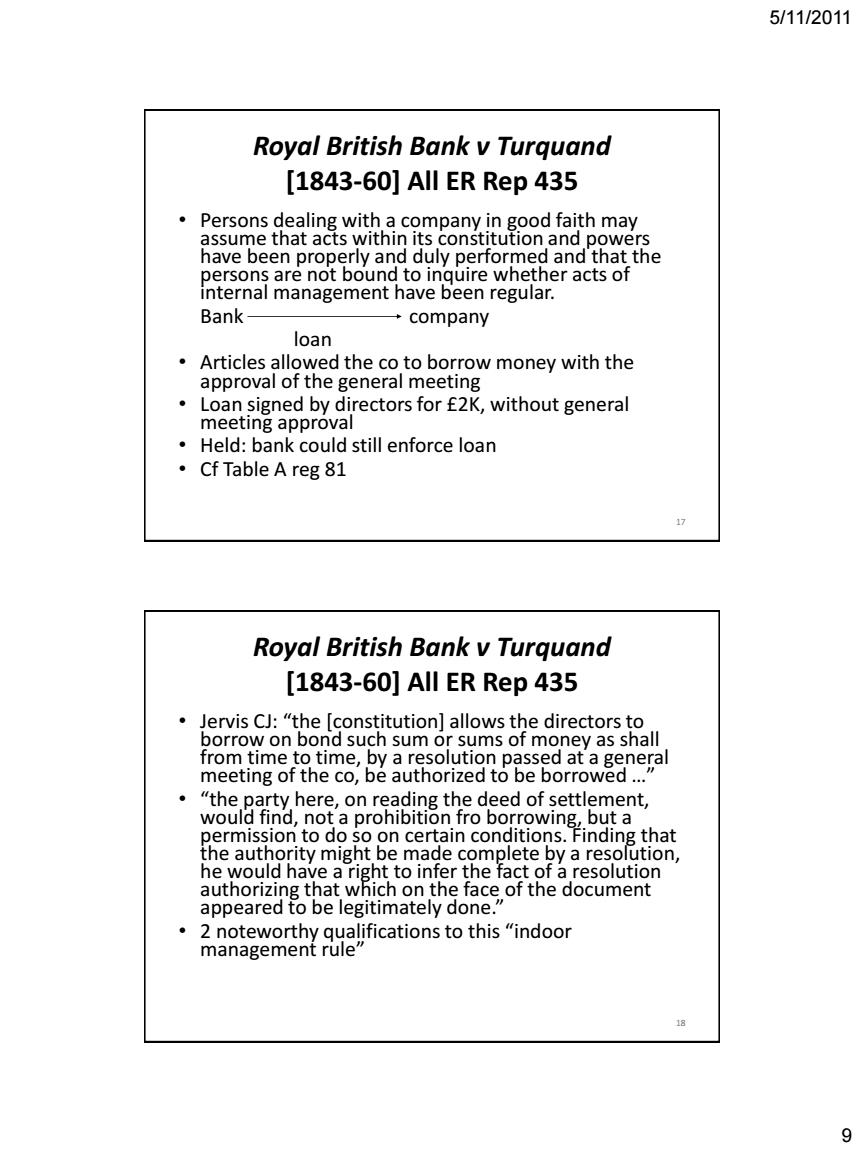
5/11/2011 Royal British Bank v Turquand [1843-60]All ER Rep435 Persons dealing with a company in good faith may assume that acts within its constitution and powers have been properly and duly performed and that the persons are not bound to inquire whether acts of internal management have been regular. Bank company loan Articles allowed the co to borrow money with the approval of the general meeting Loan signed by directors for f2K,without general meeting approval Held:bank could still enforce loan ·Cf Table A reg81 17 Royal British Bank v Turquand [1843-60]All ER Rep435 Jervis CJ:"the [constitution]allows the directors to borrow on bond such sum or sums of money as shall from time to time,by a resolution passed at a general meeting of the co,be authorized to be borrowed... "the party here,on reading the deed of settlement, would find,not a prohibition fro borrowing,but a permission to do so on certain conditions.Finding that the authority might be made complete by a resolution, he would have a right to infer the fact of a resolution authorizing that which on the face of the document appeared to be legitimately done." 2 noteworthy qualifications to this "indoor management rule 18 9
5/11/2011 9 17 Royal British Bank v Turquand [1843-60] All ER Rep 435 • Persons dealing with a company in good faith may assume that acts within its constitution and powers have been properly and duly performed and that the persons are not bound to inquire whether acts of internal management have been regular. Bank company loan • Articles allowed the co to borrow money with the approval of the general meeting • Loan signed by directors for £2K, without general meeting approval • Held: bank could still enforce loan • Cf Table A reg 81 18 Royal British Bank v Turquand [1843-60] All ER Rep 435 • Jervis CJ: “the [constitution] allows the directors to borrow on bond such sum or sums of money as shall from time to time, by a resolution passed at a general meeting of the co, be authorized to be borrowed …” • “the party here, on reading the deed of settlement, would find, not a prohibition fro borrowing, but a permission to do so on certain conditions. Finding that the authority might be made complete by a resolution, he would have a right to infer the fact of a resolution authorizing that which on the face of the document appeared to be legitimately done.” • 2 noteworthy qualifications to this “indoor management rule
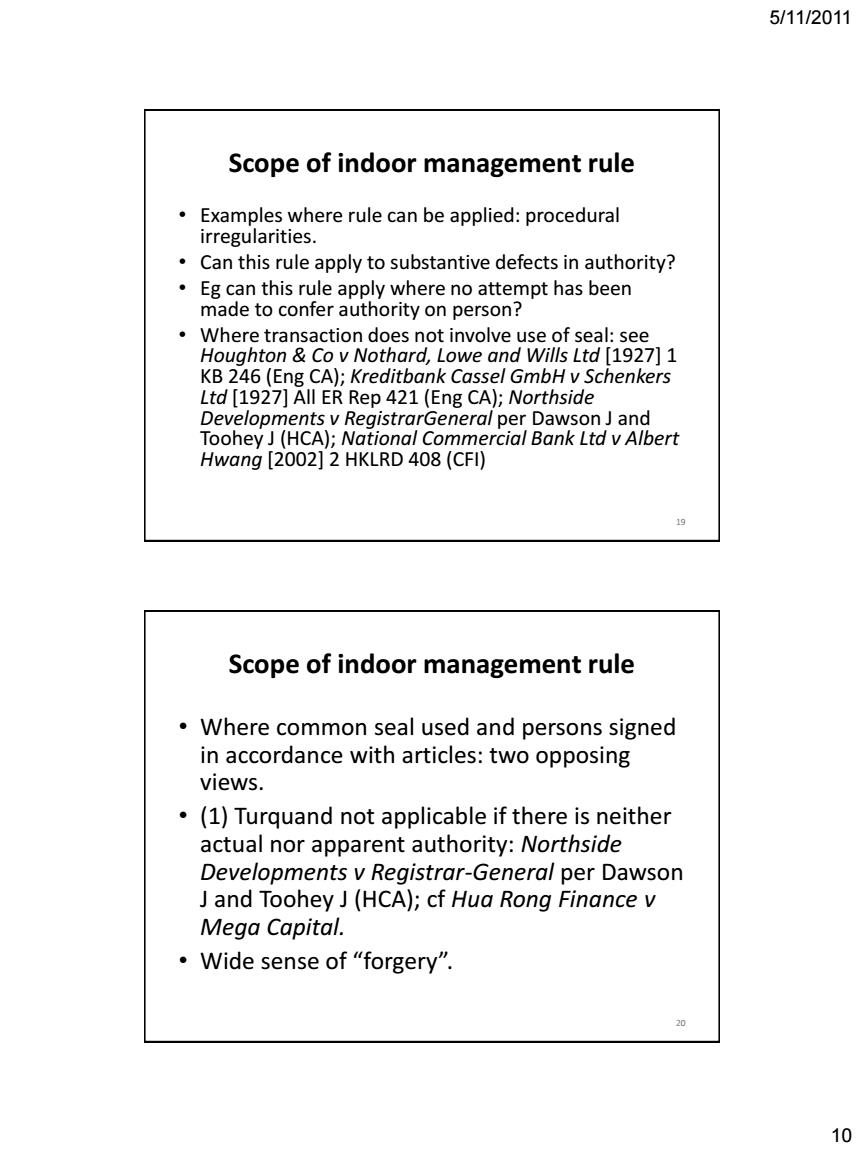
5/11/2011 Scope of indoor management rule Examples where rule can be applied:procedural irregularities. Can this rule apply to substantive defects in authority? Eg can this rule apply where no attempt has been made to confer authority on person? Where transaction does not involve use of seal:see Houghton Co v Nothard,Lowe and Wills Ltd [1927]1 KB 246(Eng CA);Kreditbank Cassel GmbH v Schenkers Ltd [1927]All ER Rep 421 (Eng CA);Northside Developments v RegistrarGeneral per Dawson J and Toohey J (HCA);National Commercial Bank Ltd v Albert Hwang [2002]2 HKLRD 408(CFI) 19 Scope of indoor management rule Where common seal used and persons signed in accordance with articles:two opposing views. .(1)Turquand not applicable if there is neither actual nor apparent authority:Northside Developments v Registrar-General per Dawson J and Toohey J(HCA);cf Hua Rong Finance v Mega Capital. Wide sense of "forgery". 10
5/11/2011 10 19 Scope of indoor management rule • Examples where rule can be applied: procedural irregularities. • Can this rule apply to substantive defects in authority? • Eg can this rule apply where no attempt has been made to confer authority on person? • Where transaction does not involve use of seal: see Houghton & Co v Nothard, Lowe and Wills Ltd [1927] 1 KB 246 (Eng CA); Kreditbank Cassel GmbH v Schenkers Ltd [1927] All ER Rep 421 (Eng CA); Northside Developments v RegistrarGeneral per Dawson J and Toohey J (HCA); National Commercial Bank Ltd v Albert Hwang [2002] 2 HKLRD 408 (CFI) 20 Scope of indoor management rule • Where common seal used and persons signed in accordance with articles: two opposing views. • (1) Turquand not applicable if there is neither actual nor apparent authority: Northside Developments v Registrar-General per Dawson J and Toohey J (HCA); cf Hua Rong Finance v Mega Capital. • Wide sense of “forgery